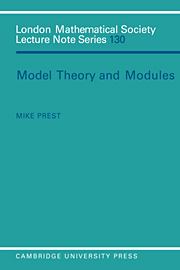Book contents
- Frontmatter
- Contents
- Introduction
- Acknowledgements
- Notations and conventions
- Remarks on the development of the area
- Section summaries
- Chapter 1 Some preliminaries
- Chapter 2 Positive primitive formulas and the sets they define
- Chapter 3 Stability and totally transcendental modules
- Chapter 4 Hulls
- Chapter 5 Forking and ranks
- Chapter 6 Stability-theoretic properties of types
- Chapter 7 Superstable modules
- Chapter 8 The lattice of pp-types and free realisations of pp-types
- Chapter 9 Types and the structure of pure-injective modules
- Chapter 10 Dimension and decomposition
- Chapter 11 Modules over artinian rings
- Chapter 12 Functor categories
- Chapter 13 Modules over Artin algebras
- Chapter 14 Projective and flat modules
- Chapter 15 Torsion and torsionfree classes
- Chapter 16 Elimination of quantifiers
- Chapter 17 Decidability and undecidability
- Problems page
- Bibliography
- Examples index
- Notation index
- Index
Chapter 11 - Modules over artinian rings
Published online by Cambridge University Press: 15 December 2009
- Frontmatter
- Contents
- Introduction
- Acknowledgements
- Notations and conventions
- Remarks on the development of the area
- Section summaries
- Chapter 1 Some preliminaries
- Chapter 2 Positive primitive formulas and the sets they define
- Chapter 3 Stability and totally transcendental modules
- Chapter 4 Hulls
- Chapter 5 Forking and ranks
- Chapter 6 Stability-theoretic properties of types
- Chapter 7 Superstable modules
- Chapter 8 The lattice of pp-types and free realisations of pp-types
- Chapter 9 Types and the structure of pure-injective modules
- Chapter 10 Dimension and decomposition
- Chapter 11 Modules over artinian rings
- Chapter 12 Functor categories
- Chapter 13 Modules over Artin algebras
- Chapter 14 Projective and flat modules
- Chapter 15 Torsion and torsionfree classes
- Chapter 16 Elimination of quantifiers
- Chapter 17 Decidability and undecidability
- Problems page
- Bibliography
- Examples index
- Notation index
- Index
Summary
In this chapter we consider those rings which are simplest, as measured by the complexity of the category of modules: the rings of finite representation type or, more generally (?), the right pure-semisimple rings.
A ring is right pure-semisimple iff every module over it is a direct sum of indecomposable submodules. These are precisely the rings whose every right module is totally transcendental (§1). To put this another way: a ring is right pure-semisimple iff the lattice P of pp-types has the ascending chain condition – so right pure-semisimplicity is the “with quantifiers” version of the right noetherian condition. The first section contains various equivalents to right puresemisimplicity, as well as “local” versions of some results (i.e., applying to arbitrary theories closed under product, rather than just to T*). I also include a proof of the fact that a right pure-semisimple ring is right artinian and that each of its indecomposable modules is of finite length.
A ring is of finite representation type if it is right pure-semisimple and if there are, up to isomorphism, only finitely many indecomposable modules. It is not known whether or not a right pure-semisimple ring must be of finite representation type. If the ring is an artin algebra, then the concepts are equivalent (though I don't prove that here): the artin algebras include the algebras which are finite-dimensional over a base field. We see (§2) that an artin algebra is of finite representation type if it has only finitely many indecomposable finitely generated modules (in fact, this is true of any right artinian ring).
Information
- Type
- Chapter
- Information
- Model Theory and Modules , pp. 228 - 246Publisher: Cambridge University PressPrint publication year: 1988
